Pressure Canning Zucchini with Tomatoes
This post may contain affiliate links, which means that I may receive a commission if you make a purchase using these links. As an Amazon Associate I earn from qualifying purchases.
Looking to savor the flavors of summer all year round? Try canning zucchini with tomatoes using our Italian-inspired recipe. It’s a delicious way to preserve these two summer favorites and enjoy them long after the season has ended.
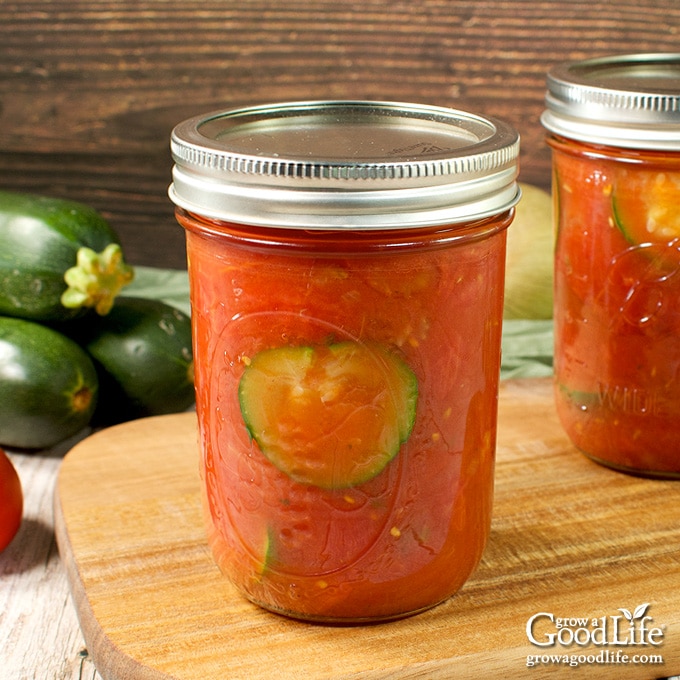
Beyond pickling, the options for canning zucchini are somewhat limited. While I’ve certainly put up my fair share of bread and butter zucchini pickles, dill-pickled zucchini, and zucchini relish, my preservation efforts often revolve around freezing zucchini shredded and sliced. Last year I tried the recipe for pressure canning Tomatoes with Zucchini in the So Easy to Preserve book. I was thrilled to discover another brilliant method to preserve this versatile vegetable.
True, the zucchini softens during the process, but it melds with the tomatoes, contributing flavor, color, and texture. With the addition of Italian herbs, these jars have earned their place on our pantry shelves, proving their worth across various dishes.
From sauces to casseroles, the versatility of stewed tomatoes and zucchini on your shelves is undeniable, making them a welcomed addition to your culinary toolkit.
Steps for Canning Italian-Style Stewed Tomatoes and Zucchini
Since this recipe is a tomato and veggie mix, you must use a pressure canner for safe canning. It’s the only way to get the high temperatures needed to kill harmful bacteria that cause foodborne illnesses. If you don’t have a pressure canner, you can freeze the mixture instead.
Before you start, familiarize yourself with the “Using Pressure Canners” guide on the National Center for Home Food Preservation website. Also, please review the instructions for your pressure canner and ensure it’s all clean and working fine.
This recipe is the “Tomatoes with Okra or Zucchini” from the So Easy to Preserve book. We have flavored it with some dried Italian seasonings to make a delicious Italian-style stewed tomatoes and zucchini ideal for spooning over roasted meat or vegetables or tossed with your favorite pasta. You can also safely add two 1/4 inch slices of onions to each jar for additional flavor if desired.
Step 1: Gather and Prepare Your Kitchen Gear
Before you begin, make sure you have all the essential kitchen tools and equipment ready to go. Here’s what you’ll need:
- Pressure Canner with Canning Rack
- Canning Jars: You’ll need 6 pint-sized canning jars, or if you prefer larger portions, 3 quart-sized jars.
- Canning Lids and Bands: Make sure you have new lids for each jar, while the bands can be reused.
- Canning Tools: A jar lifter for safe handling, a canning ladle to fill the jars, a funnel for mess-free pouring, and a bubble popper to remove any air bubbles.
- Basic Equipment: A large stainless steel saucepan, knife and cutting board, large prep bowls, measuring cups, slotted spoon, and plenty of clean kitchen towels.
Give your canning jars, lids, bands, tools, and equipment a thorough scrub in hot, soapy water, and rinse them clean. Then, set everything aside to dry on clean kitchen towels.
Step 2: Prepare the Vegetables
Wash the tomatoes and zucchini under clean, running water, and set aside to air dry.
Remove the tomato skins by bringing a large pot of water to a rolling boil over high heat. While it is heating, fill a large bowl with ice and cold water. Need more details? Check out our full tutorial: How to Skin Tomatoes.
Blanch the tomatoes in the boiling water for 30 to 60 seconds or until the skins crack and loosen. Then, use your slotted spoon to remove them from the boiling water and dunk them into the bowl of ice water to stop the cooking. Repeat until all the tomatoes are blanched.
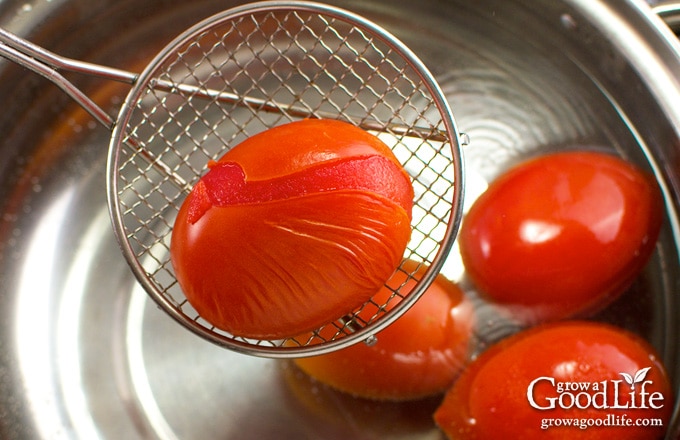
While the tomatoes are cooling, empty the water out of the pot. Once the tomatoes are cool enough to handle, remove the peelings, cut out any cores, and slice them into quarters. Drop them back into your large pot.
Trim off the stem and blossom end of the zucchini and cut into cubes or slices. If your zucchini is large, cut it in half and scoop out the spongy seed cavity before cutting.
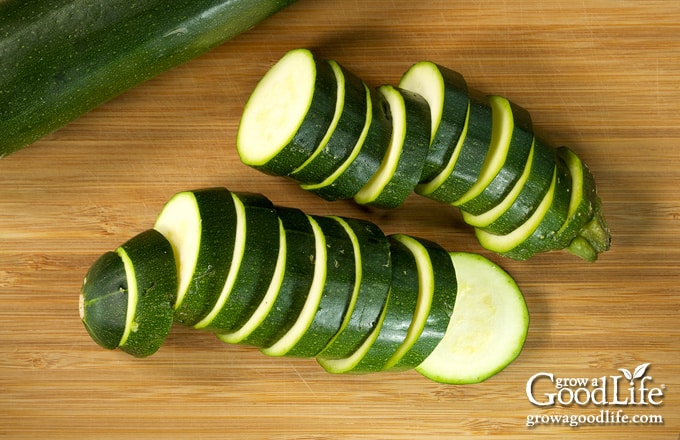
If you are including onions, peel off the skins and cut them into 1/4-inch slices. You will need 2 slices per jar. Set the zucchini and onions aside for now.
Step 3: Pre-heat the Canner and Jars
Place your jar rack into the pressure canner, and place the canner on a large burner of your stove. Measure and add the amount of water according to your canner manufacturer’s instructions: For Presto, you’ll need 3 quarts of water, while Mirro calls for 2 quarts, and All American suggests filling it 2 to 3 inches deep.
Fill the jars halfway with water and place them upright in the canner. Turn on the burner, bring the canner to a simmer (180°F), then simmer for at least 10 minutes, and keep the jars hot until you are ready to fill them.
Step 4: Simmer the Tomatoes and Zucchini
Meanwhile, place the pot of tomatoes on the stove, bring it to a boil over medium-high heat, then reduce the heat and simmer for 10 minutes.
Add the prepared zucchini, salt, and dried herbs and stir to combine. Gently boil for 5 more minutes, and keep warm as you fill your jars.
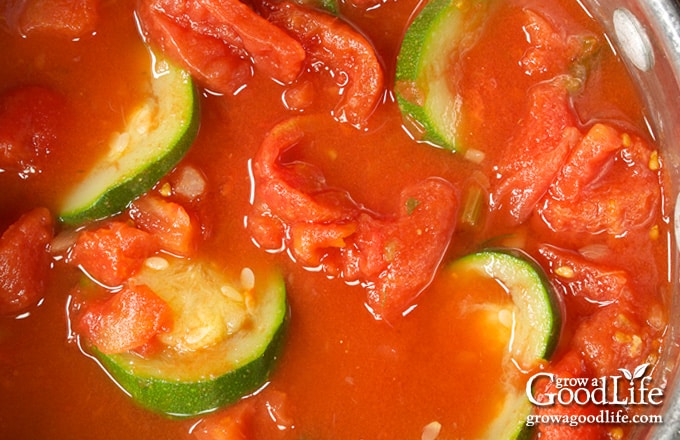
Step 5: Fill and Process the Jars
Lay a dry kitchen towel on the counter. Use the jar lifter to take a jar from the canner. Empty out the water (save it for dishwashing) and place the jar on the towel. Keep the other jars inside the canner to maintain their warmth.
Put the canning funnel on the jar. Use the slotted spoon to pack the jar with the hot zucchini and tomato mixture, leaving about 2 inches at the top of the jar.
For those including onions, slide 2 slices into the jar while filling. Then, use the ladle to top the jar with liquid while leaving a 1-inch headspace. Run the bubble popper through the jar to release any trapped air bubbles. Adjust the headspace if needed.
Use a damp towel to wipe any residue off the jar rim. Position a lid on the jar’s top, place the band over it, and screw it on until it is just fingertip tight. Put the jar back in the canner and repeat the process for the remaining jars.
Refer to your pressure canner’s instructions for sealing, venting, and heating, then process the jars for the times indicated in the recipe below.
Once the processing time is over, turn off the heat and allow the pressure to return to zero. Then, remove the jars and set them on a dry towel to cool. Keep the jars upright, and don’t fiddle with the rings or test the seals yet. The jars need time to cool undisturbed to seal properly. Let them cool completely for 12 to 24 hours.
Test the seals after the cooling period. Refrigerate any that failed to seal and use up in a few days. Before storing your jars, remove the rings and wash them thoroughly with soapy water to eliminate any residue. Then label, date, and find a cool spot to store the canned zucchini and tomatoes. For optimal flavor, consume within 12 to 18 months.
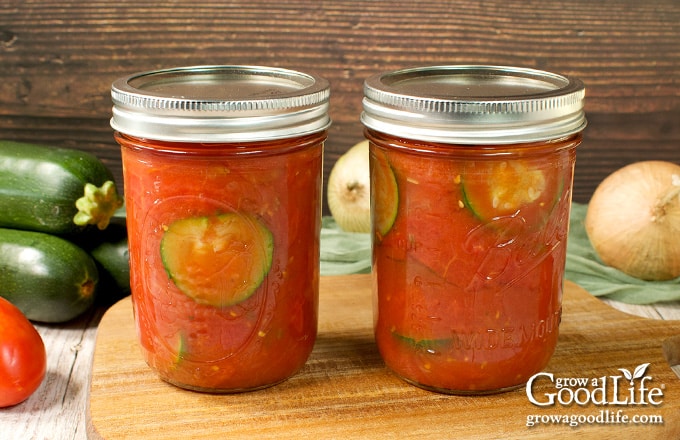
Creative Ways to Enjoy Italian-Style Stewed Tomatoes and Zucchini
Get ready to dive into culinary creativity with your home-canned zucchini and tomatoes. Here are some ideas:
- American Chop Suey: Give the classic American Chop Suey a delightful twist by substituting the usual sauce with our Italian-Style Stewed Tomatoes and Zucchini. Elevate this beloved dish with a burst of Italian-inspired flavors for a truly satisfying meal.
- Baked Chicken: Pour the stewed tomatoes and zucchini over chicken breasts, top with grated Parmesan, and bake until the chicken is cooked.
- Shakshuka: Simmer eggs in the stewed tomatoes and zucchini mixture for a delicious shakshuka breakfast or brunch.
- Stuffed Peppers: Make stuffed bell peppers by mixing cooked rice, ground meat, and a jar of stewed tomatoes and zucchini. Stuff into hollowed-out peppers and bake.
- Enhance Soups and Stews: Add a jar to your favorite slow cooker beef stew or simmer with soup.
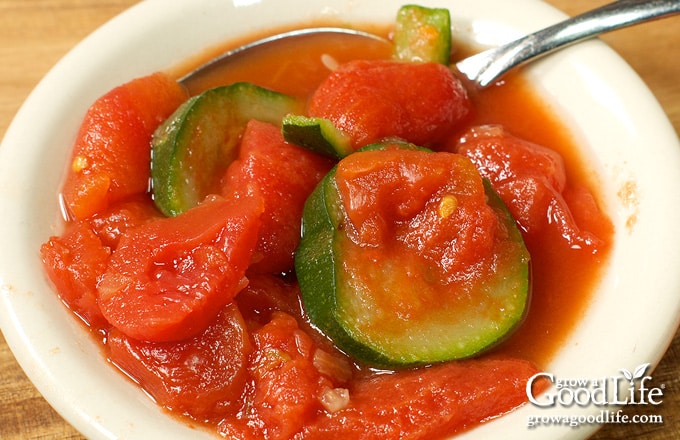
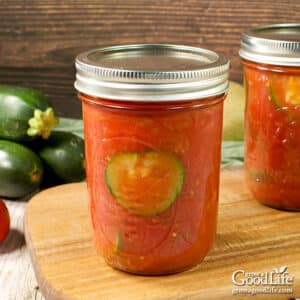
Canning Zucchini with Tomatoes
Ingredients
- 9 pounds tomatoes
- 3 pounds zucchini
- 3 medium onions optional for flavor
- 2 teaspoons salt optional for flavor
- 2 teaspoons dried basil optional for flavor
- 2 teaspoons dried oregano optional for flavor
- 1/2 teaspoon dried thyme optional for flavor
Instructions
Prepare the Vegetables:
- To peel the tomatoes, bring a large pot of water to a rolling boil and prepare a bowl of ice water.
- Cut an X in each tomato, then blanch them in boiling water for about 60 seconds until the skins crack and loosen.
- Use a slotted spoon to transfer them to the ice water. Work in batches, and repeat for all tomatoes. Let the tomatoes cool briefly.
- Once the tomatoes are cool, peel, core, quarter them, and add to your large pot. Set aside.
- For the zucchini, trim the ends, then cube or slice it. If the zucchini is large, cut it in half and scoop out the seeds before slicing. Set aside.
- Peel and slice onions (if using) into 1/4-inch slices. You’ll need 2 slices per jar. Set aside.
Prepare the Canning Equipment:
- Place the jar rack into the pressure canner, and fill it with water per your canner manufacturer’s instructions: Presto is 3 quarts, Mirro is 2 quarts, and All American is 2 to 3 inches.
- Fill the jars halfway with hot water, then place them on the rack in the canner.
- Bring the canner to a simmer for 10 minutes (180˚F). Keep them warm until you are ready to fill them.
Simmer the Tomato Zucchini Mixture:
- Put the pot of prepared tomatoes on the stove, and set it to medium-high heat. Let it come to a boil, then lower the heat to a simmer and cook for about 10 minutes.
- Add the prepared zucchini, salt, basil, oregano, and thyme. Stir everything together and let it gently boil for an additional 5 minutes. Keep warm while filling your jars.
Fill the Jars:
- Cover your counter with a towel. Use the jar lifter to take one jar out of the canner. Empty out the water (you can save it for washing dishes) and set the jar on the towel. Keep the rest of the jars inside the canner so they stay warm.
- Position the canning funnel on the jar, and use the slotted spoon to pack the jar with the hot zucchini and tomato mixture, leaving about 2 inches at the top of the jar.
- Add the 2 onion slices if you're using them, and then use the funnel and ladle to add liquid, leaving 1-inch headspace.
- Remove the funnel and run the bubble popper through the jar to release any trapped air bubbles. Adjust the headspace if necessary.
- Wipe off any residue from the jar rim with a damp towel. Place a lid on top of the jar, position the band over it, and gently screw it on until fingertip tight. Place the filled jar back into the canner and repeat the process for the remaining jars.
Process the Jars in the Pressure Canner:
- Place the lid on the canner and lock it. Leave the vent open, adjust the heat to medium-high, and bring the canner to a boil. Allow the pressure canner to vent steam for 10 minutes, place the pressure regulator on top of the air vent, and let the pressure rise.
- When the canner has reached the correct pressure (10 pounds for weighted gauge or 11 pounds for dial gauge pressure canner), set a timer and process pint jars for 30 minutes, and quarts for 35 minutes at altitudes of less than 1,000 ft.
- Adjust the pressure for your altitude if necessary (see chart below), and regulate the heat as needed to maintain a steady pressure.
- When the processing time is complete, turn off the heat, and allow the canner to stand undisturbed until pressure drops to 0. Once the canner is depressurized, let the canner cool additional 10 minutes before removing the lid.
- Spread a dry towel on the counter, unlock the cover, and remove it by tilting the lid away from you so that steam does not burn your face.
- Allow another 10 minutes for the jars to adjust to the change in pressure. If the jars are still boiling vigorously, let them sit in the canner for another 5 minutes or until the boiling slows.
- Use the jar lifter to lift jars carefully from the canner and place them on the towel. Keep the jars upright, and don’t tighten bands or check the seals yet. Let the jars sit undisturbed for 12 to 24 hours to cool.
- After 12 to 24 hours, check to be sure the jar lids have sealed by pushing on the center. The cover should not pop up. The jar failed to seal if the top flexes up and down. Refrigerate it and use it within a few days.
- Remove the screw-on bands and wash the jars in warm soapy water. Label, date, and store the jars in a cool, dark place for 12 to 18 months. Once the jar is open, refrigerate it and use it up within a week. Yields about 6 pints or 3 quart jars.
Notes
- Dial Gauge Pints and Quarts at altitudes of 2,001 – 4,000 ft. increase pressure to 12 pounds, 4,001 – 6,000 ft. is 13 pounds, and 6,001 – 8,000 ft. is 14 pounds.
- Weighted Gauge Pints and Quarts at altitudes of 1,001 ft. and above, increase pressure to 15 pounds.
Nutrition
Explore More Delectable Stewed Tomato Recipes!
Fill your pantry with various home-canned stewed tomato options catering to different tastes and preferences. Here are additional recipes to explore:
- Mexican Style Tomatoes and Chiles: A Rotel-inspired concoction of tangy tomatoes and zesty chilies preserved using a pressure canner. Infuse a lively twist into Mexican dishes.
- Crushed Tomatoes: Embrace simplicity with this crushed tomato canning recipe. Safely prepared using a water bath canner, these unadorned stewed tomatoes offer a burst of natural freshness to flavor meals.
- Stewed Tomatoes Pressure Canning Recipe: This timeless classic is tailor-made for pressure canning, locking in the essence of ripe tomatoes, celery, onions, and peppers.
- Minnesota Mix Stewed Tomatoes: This a water bath canning recipe for preserving tomatoes and vegetables developed by the University of Minnesota Extension office and ensures the safety of your tomatoes and vegetables.
40+ Meals in a Jar Pressure Canning Recipes
In this eBook, you will find 50 pressure canning recipes, including 44 meals, along with homemade stocks and bone broths. Recipes include soups, stews, chilis, beans, beef, pork, and poultry. Explore the world of preserving delicious home-cooked meals for all seasons.


the answer to the lemon juice is because its pressure canned and not water bathed. you dont need the acidity in pressure canning
Kent, Not true. Pressure canning does not automatically eliminate the need for added acid. If a tested recipe specifies lemon juice or citric acid, it must be used exactly as written for the recipe to be safe. Skipping the acid in those cases may make the canning process unsafe.
I love your recipes and have made several! Wondering why there is no lemon juice or citric acid required for the canned tomatoes and zucchini?
Susan, Thank you for your kind words and for trying out our recipes! Your question is a great one. This particular pressure canning recipe has been developed and tested by the University of Georgia Extension. Their expertise assures that the formula is safe for canning without the need for added acid. Therefore, you can be confident following a trusted and secure canning recipe. For reassurance, you can compare this recipe to the Tomatoes with Okra or Zucchini recipe on the NCHFP website.